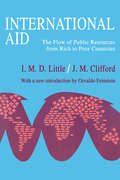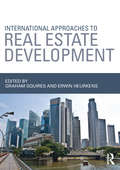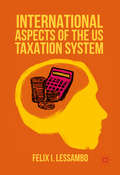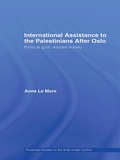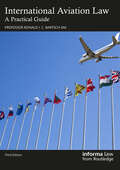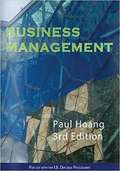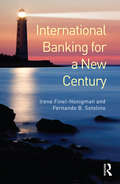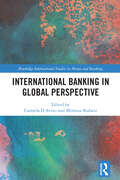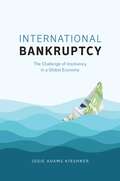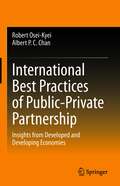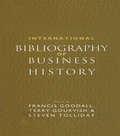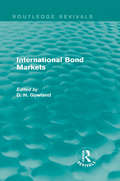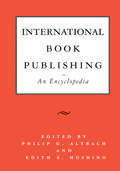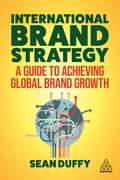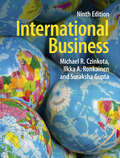- Table View
- List View
International Aid and the Making of a Better World: Reflexive Practice (Rethinking Development)
by Rosalind EybenHow can international aid professionals manage to deal with the daily dilemmas of working for the wellbeing of people in countries other than their own? A scholar-activist and lifelong development practitioner seeks to answer that question in a book that provides a vivid and accessible insight into the world of aid – its people, ideas and values against the backdrop of a broader historical analysis of the contested ideals and politics of aid operations from the 1960s to the present day. Moving between aid-recipient countries, head office and global policy spaces, Rosalind Eyben critically examines her own behaviour to explore what happens when trying to improve people’s lives in far-away countries and warns how self-deception may construct obstacles to the very change desired, considering the challenge to traditional aid practices posed by new donors like Brazil who speak of history and relationships. The book proposes that to help make this a better world, individuals and organisations working in international development must respond self-critically to the dilemmas of power and knowledge that shape aid’s messy relations. Written in an accessible way with vignettes, stories and dialogue, this critical history of aid provides practical tools and methodology for students in development studies, anthropology and international studies and for development practitioners to adopt the habit of reflexivity when helping to make a better world.
International Aid: The Flow of Public Resources from Rich to Poor Countries
by J. M. CliffordThis is a comprehensive analysis of the economics of international aid that provides a systematic framework for understanding, planning, and executing aid programs. Though much has been written on different aspects of international aid, this book was the first to synthesize information on all facets of aid and to investigate the consequences, for both donor and recipient nations, of the transfer of public resources in aid programs. The authors first present the history of aid, discuss the principles that govern aid as practiced by the United States, the United Kingdom, Russia, China, the United Nations, and other donors, and then provide a broad theoretical structure in which to discuss particular questions taken up in subsequent chapters. The book systematically covers all aspects of the aid relationship, and in addition to broad coverage of aid programs, analyzes details of the aid relationship to discern the function of the different variables of aid. In one coherent volume, International Aid outlines sound theoretical bases for discussion of aid programs, provides valuable insights into contemporary practices, and offers far-reaching suggestions on the future of aid programs. On first publication in the mid-1960s, in the midst of the Cold War, this book had considerable influence and its interest outlasts its parochial times as one of the first to discuss the effects of aid on both donor and recipient countries.
International Anti-Money Laundering and Soft Law: Approaches to Regulation (The Law of Financial Crime)
by Emmanuel EbikakeAdopting a mixed-methods approach, this book assesses the role of soft law as a technique to repress and prevent money laundering. The consequence of the combination of a non-traditional subject matter with the limitations of traditional international law instruments has meant that lawmakers seeking international solutions to the problems of money laundering have had to innovate. This book addresses two fundamental issues in the context of existing international and domestic responses to the problem of money laundering that have hitherto been neglected. These include the nature of the treaty obligations to criminalise money laundering, and the role of soft law as a technique to regulate it globally. The book concludes that international legal harmonisation and approximation of domestic anti-money laundering law through soft law remains helpful in addressing this pressing problem. The book will be of interest to academics, researchers, and policy-makers working in the areas of Financial Crime, Anti-Money Laundering Law, Regulation, International Soft Law, and Comparative Law.
International Approaches to Real Estate Development
by Graham Squires Erwin HeurkensAn international approach to the study and teaching of real estate is increasingly important in today’s global market. With chapters covering numerous countries and every continent, International Approaches to Real Estate Development introduces real estate development theory and practice to students and professionals in the comparative international context. The book provides readers with a global compendium written by an international team of experts and includes key features such as: Chapters covering: the United States; United Kingdom; Netherlands; Hungary; United Arab Emerites; Bahrain and Qatar; Ghana; Chile; India; China; Hong Kong; and Australia An introduction providing theory and concepts for comparative analysis Discussion and debate surrounding international real estate development in its approach, characteristics, geography, implementation and outcomes A concluding chapter which brings together comparative analyses of the different real estate development case study findings Reflections on the global financial crisis and the new real estate development landscape Further reading and glossary The wide range of case studies and the mix of textbook theory with research mean this book is an essential purchase for undergraduate and postgraduate students of real estate, property development, urban studies, planning and urban economics.
International Arctic Petroleum Cooperation: Barents Sea Scenarios (Routledge Studies in Environmental Policy)
by Indra Overland Anatoli Bourmistrov Frode Mellemvik Alexei Bambulyak Ove Gudmestad Anatoly ZolotukhinThe Arctic region contains large amounts of natural resources considered necessary to sustain global economic growth, so it is unsurprising that it is increasingly susceptible to political, economic, environmental, and even military conflicts. This book looks in detail at the preconditions and outlook for international cooperation on the development of Arctic petroleum resources, focusing on Norwegian–Russian cooperation in the Barents Sea towards 2025. The authors provide a cross-disciplinary approach including geopolitical, institutional, technological, corporate and environmental perspectives to analyse the underlying factors that shape the future development of the region. Three future scenarios are developed, exploring various levels of cooperation and development influenced by and resulting from potential political, commercial and environmental circumstances. Through these scenarios, the book improves understanding of the challenges and opportunities for Arctic petroleum resource development and promotes further consideration of the possible outcomes of future cooperation. The book should be of interest to students, scholars and policy-makers working in the areas of Arctic studies, oil and gas studies, energy security, global environmental governance, environmental politics and environmental technology.
International Asia Conference on Industrial Engineering and Management Innovation (IEMI2012) Proceedings: Core Areas of Industrial Engineering
by Ershi Qi Jiang Shen Runliang DouThe International Conference on Industrial Engineering and Engineering Management is sponsored by the Chinese Industrial Engineering Institution, CMES, which is the only national-level academic society for Industrial Engineering. The conference is held annually as the major event in this arena. Being the largest and the most authoritative international academic conference held in China, it provides an academic platform for experts and entrepreneurs in the areas of international industrial engineering and management to exchange their research findings. Many experts in various fields from China and around the world gather together at the conference to review, exchange, summarize and promote their achievements in the fields of industrial engineering and engineering management. For example, some experts pay special attention to the current state of the application of related techniques in China as well as their future prospects, such as green product design, quality control and management, supply chain and logistics management to address the need for, amongst other things low-carbon, energy-saving and emission-reduction. They also offer opinions on the outlook for the development of related techniques. The proceedings offers impressive methods and concrete applications for experts from colleges and universities, research institutions and enterprises who are engaged in theoretical research into industrial engineering and engineering management and its applications. As all the papers are of great value from both an academic and a practical point of view, they also provide research data for international scholars who are investigating Chinese style enterprises and engineering management.
International Aspects of the US Taxation System
by Felix I. LessamboThis book covers a broad range of the most challenging topics in US international taxation laws before breaking into separate discussions of the issues related to both inbound and outbound taxes. Real examples and selected seminal cases are analysed at the end of each chapter to simplify even the most abstract tax provisions. Practitioners, academics, and advanced students specializing in specific areas of international finance will welcome this comprehensive overview of the US tax system's international laws.
International Assistance and State-University Relations (Studies in Higher Education)
by Jo BastiaensThis book explores the goals, efforts and outcomes of international assistance to higher education over the past three decades and investigates how these have impacted changing State-university relations. Focusing on the case study of Indonesia, Bastiaens demonstrates how international aid facilitated and at times actively encouraged changing patterns of state-university relations from state control towards greater institutional autonomy. Through the use of various case studies from throughout the country and critical analysis of the relationships between international donors and domestic reformers, Bastiaens shows how the educational system of Indonesia was able to diversify resources, generate income, and become increasingly autonomous from government.
International Assistance to Police Reform
by Steffen EckhardThis book comparespolice reform operations in Kosovo and Afghanistan, addressing the internalmachinery that makes peace operations work--or not. Recognizing that the chancesfor effective peacebuilding vary widely across contexts, this book investigatesthe impact of one of the few variables that peacebuilders do control: themanagement and design of peace operations. Building on fieldresearch and over one hundred expert interviews, Internationalassistance to police reform: Managing Peacebuilding systematically compares such operations in twodifferent contexts--Kosovo and Afghanistan--by focusing specifically oninternational assistance for local police reform since 1999. Four comprehensivecase studies examine operations in Kosovo and Afghanistan before and after theEuropean Union took over police reform responsibilities: in Kosovo from the Organization for Security and Co-operationin Europe (OSCE) and in Afghanistan from the German government. Speaking toscholars and practitioners in domestic and international organizations, the bookdrills in the complex relation between headquarter diplomats and field levelconflict experts. Its findings combine to a set of recommendations forpolicy-makers to better align their operations to the contentious politics ofconflict management and peacebuilding.
International Assistance to the Palestinians after Oslo: Political guilt, wasted money (Routledge Studies on the Arab-Israeli Conflict)
by Anne Le MoreWhy has the West disbursed vertiginous sums of money to the Palestinians after Oslo? What have been donors’ motivations and above all the political consequences of the funds spent? Based on original academic research and first hand evidence, this book examines the interface between diplomacy and international assistance during the Oslo years and the intifada. By exploring the politics of international aid to the Palestinians between the creation of the Palestinian Authority and the death of President Arafat (1994-2004), Anne Le More reveals the reasons why foreign aid was not more beneficial, uncovering a context where funds from the international community was poured into the occupied Palestinian territory as a substitute for its lack of real diplomatic engagement. This book also highlights the perverse effects such huge amounts of money has had on the Palestinian population and territory, on Israeli policies in the occupied Palestinian territory, and not least on the conflict itself, particularly the prospect of its resolution along a two-state paradigm. International Assistance to the Palestinians after Oslo gives a unique narrative chronology that makes this complex story easy to understand. These features make this book a classic read for both scholars and practitioners, with lessons to be learned beyond the Israeli-Palestinian conflict
International Authority and the Responsibility to Protect
by Anne OrfordThe idea that states and the international community have a responsibility to protect populations at risk has framed internationalist debates about conflict prevention, humanitarian aid, peacekeeping and territorial administration since 2001. Anne Orford situates the 'responsibility to protect' concept in a wider historical and jurisprudential context, demonstrating that the appeal to protection as the basis for de facto authority has emerged at times of civil war or revolution - the protestant revolutions of early modern Europe, the bourgeois and communist revolutions of the following centuries and the revolution that is decolonisation. This history, from Hobbes to the UN, of the resulting attempts to ground authority on the capacity to guarantee security and protection is essential reading for all those seeking to understand, engage with, limit or critique the expansive forms of international rule authorised by the responsibility to protect concept.
International Aviation Labour Law (Routledge Research in Air and Space Law)
by Andrea TrimarchiInternational Aviation Labour Law explores the status quo of the international regulation of labour and employment within the air transport industry and provides a detailed analysis of the regulatory endeavours undertaken at the international, European and domestic level to harmonise aviation labour regulations and ensure adequate labour standards for aircrew members. Offering an original insight into the regulation of labour in the aviation sector and airline industry, it analyses regulatory endeavours undertaken at the international, European and domestic level, exploring the main challenges arising from non-uniform and fragmented regulation of labour standards in the air transport sector. In particular, it investigates whether aviation labour regulations are sufficiently harmonised at an international level to ensure adequate labour standards for aircrew members. Key concerns relating to aviation labour are dealt with from a regulatory and practical perspective, and the current normative gaps are examined in view of potential future regulatory trends and solutions via a thorough analysis of the applicable legislation, landmark court decisions and the use of practical examples, to provide an overview of the various nuances of the topic. The book identifies and explore the main implications and repercussions of regulatory asymmetry and highlights the critical role of labour for air transport and how discrepancies in labour regulation may affect the practice of flying and the essence of aviation safety. It emphasises a strong need for international regulatory coordination and is a key reference for a varied audience of students, academics, professionals and rule-makers involved in the air transport arena and for all those who have an interest in the regulation of labour and employment in aviation.
International Aviation Law: A Practical Guide
by Ronald I. Bartsch AMThis is the third edition of a now-renowned guide that provides an extensive account of the state of the aviation industry and the law that regulates it. This new edition, revised and updated throughout, focuses on environmental and sustainability considerations, and includes a new chapter on innovations aimed towards meeting the 2050 Net Zero Emission targets endorsed by the International Civil Aviation Organisation (ICAO) and the International Air Transport Association (IATA).International Aviation Law: A Practical Guide explains the international context and application of the law as it applies to commercial and recreational aviation, and to the broader aviation environment. It provides a comprehensive introduction to all aspects of aviation law, from criminal law to contract law, to the legal duties and responsibility of aircrew and other aviation personnel including airport operators, air traffic controllers and aircraft engineers. Each area of the law is clearly explained in accessible language and supported with practical case studies to illustrate the application of the law within an operational aviation context. It also provides advice on how to avoid or minimize legal liability for those working in the aviation industry.The book is written for a very broad readership of those working within the aviation industry, those aspiring to work within it and those within the legal profession dealing with air transportation, as well as students within the same industries. The third edition will additionally find favour with new readers seeking information on environmental issues and answers to the question of how the aviation sector will meet the 2050 emission targets.
International Baccalaureate Business & Management (Second Edition)
by Paul HoangThis book follows the format of the IB Business & Management syllabus (first examination in 2009). It is a dedicated text for both the Standard Level (SL) and Higher Level (HL) courses.
International Baccalaureate Business and Management
by Paul HoangThis book follows the format of the IB Business Management syllabus (first examination in 2016). It is a dedicated text for both the Standard Level (SL) and Higher Level (HL) courses. Units and sections that only apply to HL students are clearly highlighted. The textbook contains 210 examination-style questions. Case studies from around the world have been used in these questions to signify the international nature of IB Business Management. There are 90 examination tips that appear throughout the text. Over 125 Theory of Knowledge questions are integrated in the text. 55 IB Learner Profile connections are also included as part of the IB teaching and learning pedagogy.
International Banking for a New Century
by Irene Finel-Honigman Fernando B. SotelinoThis new textbook provides an up-to-date overview of international banking as the second decade of the twenty-first century unfolds. Integrating geo-economic, operational, institutional and regulatory changes in the financial sector, the volume’s methodology incorporates specific case studies and research, combining theory with practical examples to illustrate the impact and consequences of past and present financial crises. The volume considers the core aspects of international banking, including its structural and technical features, historical context, institutional evolution in core markets, and wholesale, retail, investment and private banking. It uses specific examples from past and present literature, post-2008 case studies and histories, and research materials, offering a fully updated overview of how international banks respond to global crises, the origin, efficacy and evolution of financial markets, and the regulatory framework within which they function. One chapter is devoted to the evolution and potential of new markets, including the financial sectors of the BRICS and other emerging economies. Each chapter examines background, causes, impact and resolution, focusing on specific cases and their broader implications for the sector.? This textbook is a guide to the new, and at times unchartered, landscape to be navigated by large domestic, cross-regional and global banks, and will be invaluable reading for students of finance, business and economics, as well as for those in the financial sector.
International Banking in Global Perspective (Routledge International Studies in Money and Banking)
by Mimoza Shabani Carmela D’AvinoBanks play the most vital role in the economy by acting as financial intermediaries and providing the necessary credit to fund consumption and investment, thereby effecting real economic activity. Banks have been in existence for centuries and while the core of their function remains the same, their business model has changed dramatically over the years. Most notably, banking internationalisation has gained prominence in the last three decades.This book offers a comprehensive understanding of the business model, challenges and benefits of international banks.It features banks that are global and highlights their overseas activities. It documents the recent trends in international banking activity and serves as a one-stop-shop for students and scholars. Furthermore, in the post-financial crisis of 2007-09 there has been a surge in the FinTech industry where banks have sought an opportunity to expand and compete, the core of which is the provision of services via the newly established online technology as well as the green finance initiative. The book brings together the issues and opportunities ahead as global banks respond to market and environment conditions in these arenas.The text will be a useful resource for students, researchers and scholars of banking, international finance and international economics as well as students wishing to pursue a professional career in banking. Given the vital role banks play in the economy, their structure and activities are of great interest to policy makers also.
International Bankruptcy: The Challenge of Insolvency in a Global Economy
by Jodie Adams KirshnerWith the growth of international business and the rise of companies with subsidiaries around the world, the question of where a company should file bankruptcy proceedings has become increasingly complicated. Today, most businesses are likely to have international trading partners, or to operate and hold assets in more than one country. To execute a corporate restructuring or liquidation under several different insolvency regimes at once is an enormous and expensive challenge. With International Bankruptcy, Jodie Adams Kirshner explores the issues involved in determining which courts should have jurisdiction and which laws should apply in addressing problems within. Kirshner brings together theory with the discussion of specific cases and legal developments to explore this developing area of law. Looking at the key issues that arise in cross-border proceedings, International Bankruptcy offers a guide to this legal environment. In addition, she explores how globalization has encouraged the creation of new legal practices that bypass national legal systems, such as the European Insolvency Framework and the Model Law on Cross-Border Insolvency of the United Nations Commission on International Trade Law. The traditional comparative law framework misses the nuances of these dynamics. Ultimately, Kirshner draws both positive and negative lessons about regulatory coordination in the hope of finding cleaner and more productive paths to wind down or rehabilitate failing international companies.
International Best Practices of Public-Private Partnership: Insights from Developed and Developing Economies
by Albert P. Chan Robert Osei-KyeiThis book discusses how Public-Private Partnership (PPP) is practiced in developed and developing economies. The book demonstrates how PPP as a concept has grown over the years with many governments particularly from developing economies/countries seeking to enhance infrastructure growth and development through this scheme. Further, the book explores how PPP has become the major infrastructure procurement policy adopted by many governments globally to address the rapid increase in demand for infrastructure due to the increase in population growth. Although, there are many available textbooks on PPP, this book is unique because it provides in-depth analysis and discussion on the international best practices of PPP from developed and developing economies perspectives. This book provides strategic measures, useful practices and information about the similarities and differences in PPP practices in developed and developing economies based on empirical evidence and case studies. This book is structured in nine chapters. The first chapter explores the basic concept of PPPs. The second chapter looks at the global development and practices of PPP particularly from developed and developing economies’ perspectives. The third to the eight chapters explores critical topics and issues in international PPP practices from developed and developing economies perspectives. The topics included in this book are: governments motivations for adopting PPPs, barriers to PPP implementation, measuring PPP project success, risk management in PPPs, causes of conflict and conflict resolution mechanisms in PPPs and management of unsolicited proposals. The ninth chapter presents a comprehensive best practice framework for implementing international PPP projects. This book is useful to undergraduate and postgraduate students in architecture, civil engineering, business, construction and project management, researchers interested in PPP topics, international investors and financiers, public authorities and departments and international development banks. This book provides in-depth insights and understanding on the best practices for PPP from the international perspective especially from the viewpoint of countries with diverse culture and policies. Importantly, readers will be adequately informed of the similarities and differences of PPP practices and processes in developed and developing economies based on empirical evidence. Investors and governments will be informed of the strategic plans and preventive actions to employ when engaging in PPP arrangements in any part of the world.
International Bibliography of Business History
by Terry Gourvish Francis Goodall Steven TollidayThe field of business history has changed and grown dramatically over the last few years. There is less interest in the traditional `company-centred' approach and more concern about the wider business context. With the growth of multi-national corporations in the 1980s, international and inter-firm comparisons have gained in importance. In addition, there has been a move towards improving links with mainstream economic, financial and social history through techniques and outlook. The International Bibliography of Business History brings all of the strands together and provides the user with a comprehensive guide to the literature in the field.The Bibliography is a unique volume which covers the depth and breadth of research in business history. This exhaustive volume has been compiled by a team of subject specialists from around the world under the editorship of three prestigious business historians.
International Bioenergy Trade
by Martin Junginger Chun Sheng Goh André FaaijThe trade of global bioenergy commodities, such as ethanol, biodiesel and wood pellets has been growing exponentially in the past decade, and have by 2013 reached true "commodity" volumes, i. e. tens of millions of tonnes traded each year, and billions (both in US$/e) of annual turnover. IEA Bioenergy Task 40 was founded in 2004 and is now in its 4th triennium. For the past 9 years, task 40 has monitored the developments in international bioenergy trade, including the organization of about 20 workshops on trade-related topics, and the publication of over 100 studies, country reports, newsletters, etc. The amount of material produced over the years and insights gained in how biomass markets and international trade of biomass and biofuels has developed is impressive. Besides that the group has produced overviews and insights, also a large amount of practical experience has been brought together in what works and what doesn't. Last but not least, based on all this, there are clear(er) views on how to proceed to build working sustainable international biomass markets in the future. This book compiles those lessons and insights into an easily accessible book publication.
International Bond Markets (Routledge Revivals)
by D. H. GowlandFirst published in 1990, International Bond Markets analyses how the markets in public-sector debt have developed and how they operate in a number of countries, including those with chronic budget deficits. Alongside a detailed introduction to government borrowing, chapters consider the bond markets and debt management systems of the U.S.A., Japan, France, Italy and the U.K. With governments around the world struggling to manage their huge deficits, this is a particularly relevant title to students observing the current global economic situation, and those with a general interest in public debt management and bond markets.
International Book Publishing: An Encyclopedia
by Philip G. Altbach Edith S. HoshinoFirst Published in 1996. This encyclopedia is unique in several ways. As the first international reference source on publishing, it is a pioneering venture. Our aim is to provide comprehensive discussion and analysis of key subjects relating to books and publishing worldwide. The sixty-four essays included here feature not only factual and statistical information about the topic, but also analysis and evaluation of those facts and figures. The chapters are significantly more comprehensive than those typically found in an encyclopedia.
International Brand Strategy: A Guide to Achieving Global Brand Growth
by Sean DuffyIn theory, the Internet allows all brands to market internationally. But in practice, most companies struggle to compete outside their home market. Written from a marketing practitioner's perspective, International Brand Strategy evens the playing field with clear, actionable techniques to guide any organization going through the process. This book helps companies build sales in foreign markets, but just as important it helps them thrive by maintaining price integrity and building brand equity at the same time. With the guidance provided in International Brand Strategy companies hit the ground running in foreign markets. This provides a competitive advantage from day one, empowers companies to avoid costly mistakes, and saves months of trial and error. The book lays out a unique methodology for managing brands abroad that can be implemented for any product in any market. These methods have proven their value for companies large and small across six continents. The book guides readers with pragmatic models and a wealth of examples from the Americas, Europe, and Asia. International Brand Strategy was written for those who are planning to enter a new market and for those who are already there but wish to improve their brand's performance. It helps the reader recognize some of the most common pitfalls and how to avoid them, provides practical tips to understand the dynamics of price, product and value from a foreign buyer's perspective, and defines a conceptual framework to assess and improve brand equity at home and abroad.
International Business
by Ilkka A. Ronkainen Michael R. Czinkota Suraksha GuptaThoroughly updated, the 9th edition of this bestselling textbook incorporates global trends and data, supported by an exemplary case selection based on firms from around the world. The internationally cited author team of Czinkota, Ronkainen, and Gupta balance conceptual understanding of business theory with the day-to-day realities of business practice, preparing students to become successful participants in the global business place. This edition brings greater focus on Asia and emerging markets, as well as Brexit, the impact of COVID-19 on business and the importance of technology and the digital space to international business practice. Through its discussion and analysis, the book guides students to a greater understanding of contemporary business issues and helps them to develop new tools of analysis. Covering all key aspects of international business, the authors emphasize a few key dimensions: international context, role of government in international business, small- and medium-sized firms, and social responsibility.

